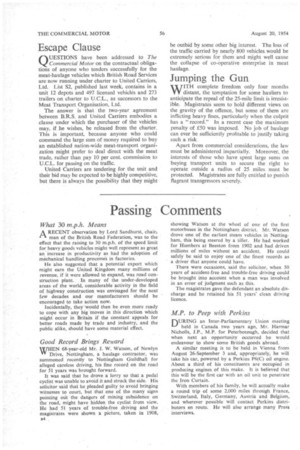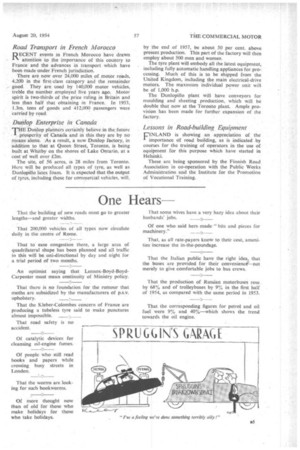Passing Comments
Page 38

Page 39

If you've noticed an error in this article please click here to report it so we can fix it.
What 30 m.p.h. Means
A RECENT observation by Lord Sandhurst, chair;
man of the British Road Federation, was to the effect that the raising to 30 m.p.h. of the speed limit for heavy goods vehicles might well represent as great an increase in productivity as had the adoption of mechanical handling processes in factories.
He also suggested that a potential export which might earn the United Kingdom many millions of revenue, if it were allowed to expand, was road construction plant. In many of the under-developed areas of the world, considerable activity in the field of highway construction was envisaged for the next few decades and our manufacturers should be encouraged to take action now.
Incidentally, they 'would then be even more ready to cope with any big Moves in this direction which might occur in Britain if the constant appeals for better roads made by trade and industry, and the public alike, should have some material effect.
Good Record Brings Reward
wHEN 68-year-old Mr. J. W. Watson, of Newlyn " Drive, Nottingham, a haulage contractor, was summoned recently to Nottingham Guildhall for alleged careless driving, his fine record on the road for 51 years was brought forward.
It was said that he drove a lorry so that a pedal cyclist was unable to avoid it and struck the side. His solicitor said that he pleaded guilty to avoid bringing witnesses to court, but that one of the many signs pointing out the dangers of mining subsidence on the road, might have hidden the cyclist from view. He had 51 years of trouble-free driving and the magistrates were shown a picture, taken in 1908, E4 showing Watson at the wheel of one of the first motorbuses in the Nottingham district. Mr. Watson drove one of the earliest steam vehicles in Nottingham, this being steered by a tiller. He had worked for Humbers at Beeston from 1902 and had driven millions of miles without an accident. He could safely be said to enjoy one of the finest records as a driver that anyone could have.
There were occasions, said the solicitor, when 50 years of accident-free and trouble-free driving could be brought into account when a man was involved in an error of judgment such as this.
The magistrates gave the defendant an absolute discharge and he retained his 51 years' clean driving licence.
M.P. to Peep with Perkins MIRING an Inter-Parliamentary Union meeting
held in Canada two years ago, Mr. Harmar Nicholls, J.P., M.P. for Peterborough, decided that when next an opportunity occurred he would endeavour to show simile British goods abroad.
A similar meeting is to be held in Vienna from August 26-September 3 and, appropriately, he will take his car, powered by a Perkins P6(C) oil engine. About a third of his constituents are occupied in producing engines of this make. It is believed that this will be the first car with an oil unit to penetrate the Iron Curtain.
With members of his family, he will actually make a round trip of some 2,000 miles through France, Switzerland, Italy, Germany, Austria and Belgium, and wherever 'possible will contact Perkins distributors en route. He will also arrange many Press interviews.
Road Transport in French Morocco
RECENT events in French Morocco have drawn attention to the importance of this country to France and the advances in transport which have been made under French jurisdiction.
There are now over 24,000 miles, of motor roads, 4,200 in the first-class category and the remainder good. They are used by 140,000 motor vehicles, treble the number employed five years ago. Motor spirit is two-thirds of the price ruling in Britain and less than half that obtaining in France. In 1953, 13m. tons of goods and 412,000 passengers were carried by road.
Dunlop Enterprise in Canada
THE Dunlop planners certainly believe in the future A prosperity of Canada and in this they are by no means alone. As a result, a new Dunlop factory, in addition to that at Queen Street, Toronto, is being built at Whitby on the shores of Lake Ontario, at a cost of well over £2m.
The site, of 56 acres, is 28 miles from Toronto_ Here will be produced all types of tyre, as well as Dunlopillo latex foam. It is expected that the output of tyres, including those for commercial vehicles, will, by the end of 1957, be about 50 per cent, above present production. This part of the factory will then employ about 500 men and women.
The tyre plant will embody all the latest equipment, including fully automatic handling appliances for pro: cessing. Much of this is to be shipped from the United Kingdom, including the main electrical-drive motors. The maximum individual power unit will be of 1,000 h.p.
The Dunlopillo plant will have conveyors for moulding and sheeting production, which will be double that now at the Toronto plant. Ample provision has been made for further expansion of the factory.
Lessons in Road-building Equipment
FINLAND is showing an appreciation of the importance of road building, as is indicated by courses for the training of operators in the use of equipment for this purpose which have started in
These are being sponsored by the Finnish Road Association in co-operation with the Public Works Administration and the Institute for the Promotion of Vocational Training.




































































































